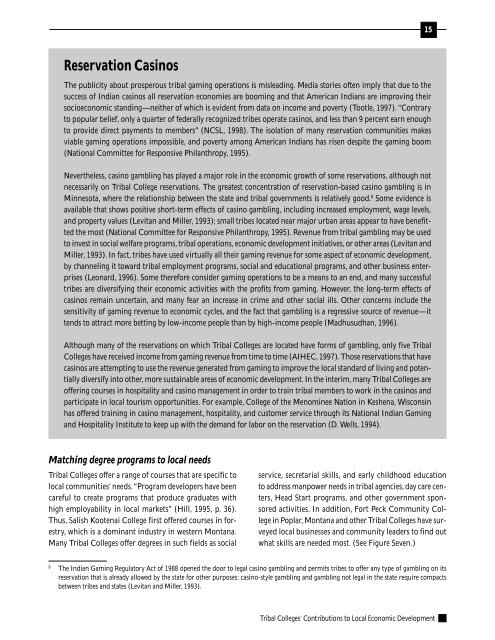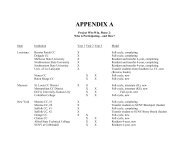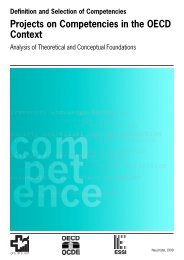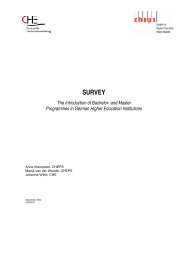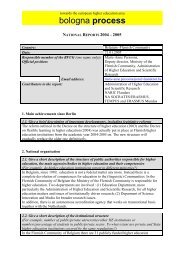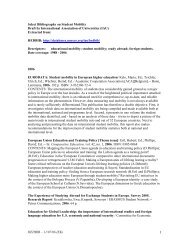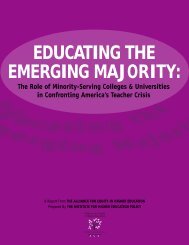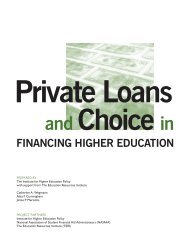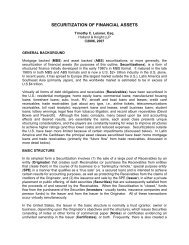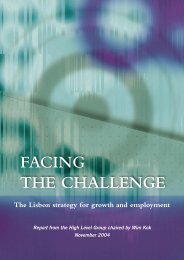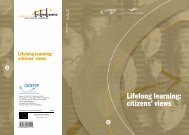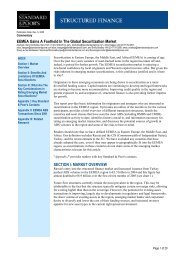Tribal College Contributions to Local Economic Development
Tribal College Contributions to Local Economic Development
Tribal College Contributions to Local Economic Development
- No tags were found...
You also want an ePaper? Increase the reach of your titles
YUMPU automatically turns print PDFs into web optimized ePapers that Google loves.
15Reservation CasinosThe publicity about prosperous tribal gaming operations is misleading. Media s<strong>to</strong>ries often imply that due <strong>to</strong> thesuccess of Indian casinos all reservation economies are booming and that American Indians are improving theirsocioeconomic standing—neither of which is evident from data on income and poverty (Tootle, 1997). “Contrary<strong>to</strong> popular belief, only a quarter of federally recognized tribes operate casinos, and less than 9 percent earn enough<strong>to</strong> provide direct payments <strong>to</strong> members” (NCSL, 1998). The isolation of many reservation communities makesviable gaming operations impossible, and poverty among American Indians has risen despite the gaming boom(National Committee for Responsive Philanthropy, 1995).Nevertheless, casino gambling has played a major role in the economic growth of some reservations, although notnecessarily on <strong>Tribal</strong> <strong>College</strong> reservations. The greatest concentration of reservation-based casino gambling is inMinnesota, where the relationship between the state and tribal governments is relatively good. 8 Some evidence isavailable that shows positive short-term effects of casino gambling, including increased employment, wage levels,and property values (Levitan and Miller, 1993); small tribes located near major urban areas appear <strong>to</strong> have benefittedthe most (National Committee for Responsive Philanthropy, 1995). Revenue from tribal gambling may be used<strong>to</strong> invest in social welfare programs, tribal operations, economic development initiatives, or other areas (Levitan andMiller, 1993). In fact, tribes have used virtually all their gaming revenue for some aspect of economic development,by channeling it <strong>to</strong>ward tribal employment programs, social and educational programs, and other business enterprises(Leonard, 1996). Some therefore consider gaming operations <strong>to</strong> be a means <strong>to</strong> an end, and many successfultribes are diversifying their economic activities with the profits from gaming. However, the long-term effects ofcasinos remain uncertain, and many fear an increase in crime and other social ills. Other concerns include thesensitivity of gaming revenue <strong>to</strong> economic cycles, and the fact that gambling is a regressive source of revenue—ittends <strong>to</strong> attract more betting by low-income people than by high-income people (Madhusudhan, 1996).Although many of the reservations on which <strong>Tribal</strong> <strong>College</strong>s are located have forms of gambling, only five <strong>Tribal</strong><strong>College</strong>s have received income from gaming revenue from time <strong>to</strong> time (AIHEC, 1997). Those reservations that havecasinos are attempting <strong>to</strong> use the revenue generated from gaming <strong>to</strong> improve the local standard of living and potentiallydiversify in<strong>to</strong> other, more sustainable areas of economic development. In the interim, many <strong>Tribal</strong> <strong>College</strong>s areoffering courses in hospitality and casino management in order <strong>to</strong> train tribal members <strong>to</strong> work in the casinos andparticipate in local <strong>to</strong>urism opportunities. For example, <strong>College</strong> of the Menominee Nation in Keshena, Wisconsinhas offered training in casino management, hospitality, and cus<strong>to</strong>mer service through its National Indian Gamingand Hospitality Institute <strong>to</strong> keep up with the demand for labor on the reservation (D. Wells, 1994).Matching degree programs <strong>to</strong> local needs<strong>Tribal</strong> <strong>College</strong>s offer a range of courses that are specific <strong>to</strong>local communities’ needs. “Program developers have beencareful <strong>to</strong> create programs that produce graduates withhigh employability in local markets” (Hill, 1995, p. 36).Thus, Salish Kootenai <strong>College</strong> first offered courses in forestry,which is a dominant industry in western Montana.Many <strong>Tribal</strong> <strong>College</strong>s offer degrees in such fields as socialservice, secretarial skills, and early childhood education<strong>to</strong> address manpower needs in tribal agencies, day care centers,Head Start programs, and other government sponsoredactivities. In addition, Fort Peck Community <strong>College</strong>in Poplar, Montana and other <strong>Tribal</strong> <strong>College</strong>s have surveyedlocal businesses and community leaders <strong>to</strong> find outwhat skills are needed most. (See Figure Seven.)8The Indian Gaming Regula<strong>to</strong>ry Act of 1988 opened the door <strong>to</strong> legal casino gambling and permits tribes <strong>to</strong> offer any type of gambling on itsreservation that is already allowed by the state for other purposes; casino-style gambling and gambling not legal in the state require compactsbetween tribes and states (Levitan and Miller, 1993).<strong>Tribal</strong> <strong>College</strong>s’ <strong>Contributions</strong> <strong>to</strong> <strong>Local</strong> <strong>Economic</strong> <strong>Development</strong>


